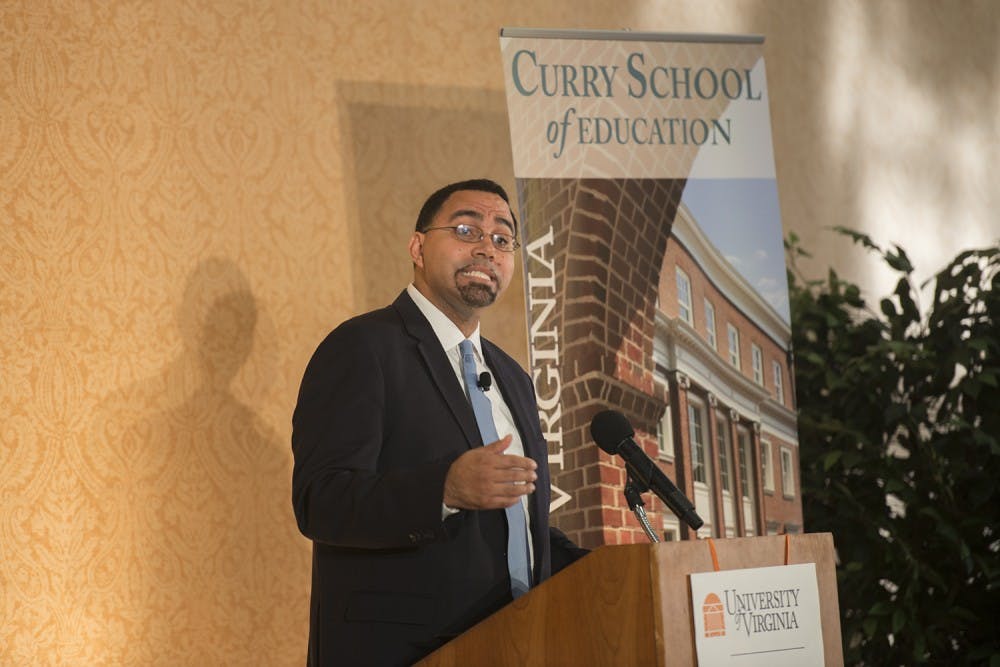U.S. Secretary of Education John B. King, Jr., gave a lecture about early childhood education Wednesday afternoon at Alumni Hall. The event was a part of the Walter N. Ridley Distinguished Speaker Series honoring Walter Ridley, the first African American to receive a doctoral degree from the University.
Executive Vice President and Provost Tom Katsouleas introduced King as the speaker, who has been the secretary of education since January 2016. Katsouleas highlighted some of King’s past positions, including principal senior advisor of the Department of Education, New York State education commissioner and middle school principal.
After the introduction, King began his lecture by mentioning some of the education achievements of the Obama administration.
“Education was a top priority for President [Barack] Obama when he took office almost eight years ago at the height of the Great Recession,” King said.
King said our country has celebrated its highest high school graduation rate ever at 83 percent. He also mentioned there are one million more African-American and Latino students attending college since Obama took office in 2009.
King’s primary focus of the lecture was on expanding the access and quality of early childhood education.
“There are two parts to that — access and quality,” King said. “Access to a low quality program is no access at all.”
King said he believes it is necessary to expand the opportunity preschool education provides by allowing it to be more accessible to lower-income families.
“If we don’t do that, then we’ve failed,” he said.
The U.S. has seen some progress in increasing accessibility since 2009, a time when fewer than 40 states offered free public preschool. At this time, only five states do not offer it, King said.
King said he is also focused on improving the quality of preschools, citing research showing the quality of preschools matter. He cited a 1960 study that showed how students who received a quality preschool education were more likely to graduate high school, earn more money and stay out of jail.
“Early learning environments must be safe, clean, stimulating, bright and healthy,” King said. “The child-to-adult ratio should be reasonable.”
King described the ideal learning environment as more of a “quality checklist,” making the point that this “checklist” is not enough.
“The essence of quality is in the interaction between teachers and children,” King said. “Are [teachers] warm and nurturing? How do they handle behavior issues? Is it productive or punitive?”
King used this opportunity to discuss preschool teachers and the difficulties they face, one of which is the pay they receive. In June, the Department of Education released a report with the Department of Health and Human Services concerning the wage gap of preschool teachers.
The wages of an early childhood educator, 97 percent of which are female, are closer to the wages of a nail technician than a K-12 teacher. They are paid less than the federal poverty wage for a family of three, and many preschool teachers have to have a second job to make ends meet, King said.
Despite the challenges of creating an accessible and quality preschool program across the country, King said “we can’t afford not to” institute quality early education.
Following the lecture, King answered a few questions from the audience.
Attendees asked questions regarding how policies have been institutionalized to ensure they remain after the Obama administration leaves, how the Department of Education is helping to close the gap between the U.S. and other countries in STEM education and what can be done about schools that are more segregated today than they were during the Civil Rights Movement.
Fourth-year College student Kiera Givens said she appreciated how King went into detail about current initiatives.
“I loved that his lecture contained so much detailed content about education policy in the U.S.,” Givens said.
Third-year College student Tyler Ambrose said he also enjoyed the specificity of King’s lecture, especially in regards to preschool education and institutionalizing aspects of the Obama administration’s education initiatives.
“A few things that stood out to me included his emphasis on expanding access to preschool education — highlighting West Virginia as an exemplar — and the efforts being made to institutionalize components of the My Brother's Keeper Initiative following President Obama's departure from the office through means like incentivizing universities to pursue and retain Pell Grant recipients,” Ambrose said.
During this time, King briefly addressed higher education, stating that while making college affordable is one of the president’s goals, he is also focused on ensuring students complete college and earn a degree.
King mentioned ways to help students stay on track to graduate by potentially offering access to Pell Grants during the summer and encouraging students to take 15 credits per semester. He also discussed offering colleges and universities an institutional incentive for accepting and graduating low-income students.
King acknowledged an additional challenge in higher education — creating culturally diverse and unified colleges.
“We still have work to do to ensure our campuses are diverse, inclusive and welcoming,” King said. “Only then, will we have achieved the true promise of higher education for all.”







